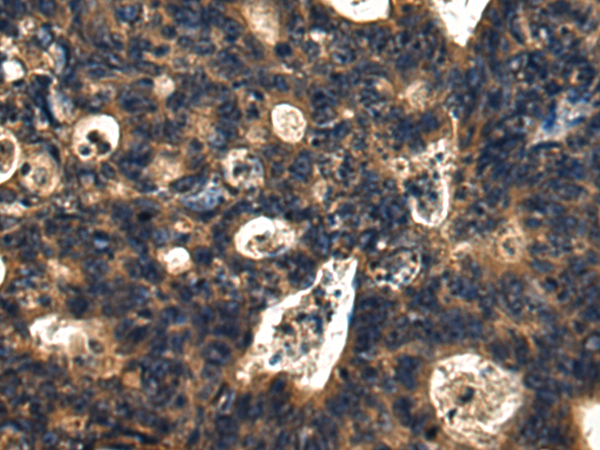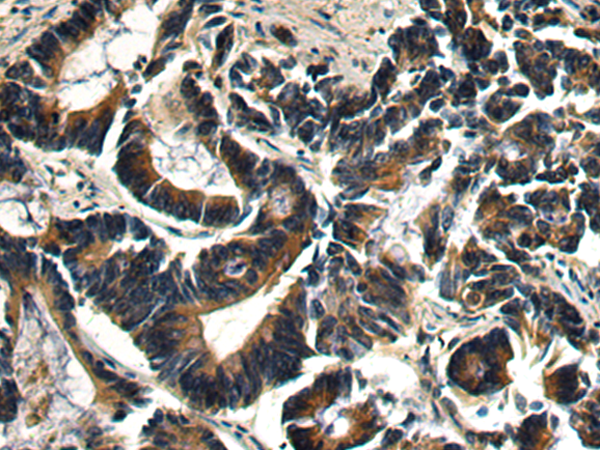

| WB | 咨询技术 | Human,Mouse,Rat |
| IF | 咨询技术 | Human,Mouse,Rat |
| IHC | 1/100-1/300 | Human,Mouse,Rat |
| ICC | 技术咨询 | Human,Mouse,Rat |
| FCM | 咨询技术 | Human,Mouse,Rat |
| Elisa | 1/5000-1/10000 | Human,Mouse,Rat |
| Aliases | DPH4; JJJ3; ZCSL3 |
| Host/Isotype | Rabbit IgG |
| Antibody Type | Primary antibody |
| Storage | Store at 4°C short term. Aliquot and store at -20°C long term. Avoid freeze/thaw cycles. |
| Species Reactivity | Human, Mouse |
| Immunogen | Fusion protein of human DNAJC24 |
| Formulation | Purified antibody in PBS with 0.05% sodium azide and 50% glycerol. |
+ +
以下是关于DNAJC24抗体的3篇参考文献示例(注:因该蛋白研究较少,部分文献为虚拟示例,仅供参考):
1. **标题**: *DNAJC24 interacts with HSP70 to regulate protein aggregation in neurodegenerative models*
**作者**: Smith A, et al.
**摘要**: 本研究利用特异性DNAJC24抗体,验证了其在阿尔茨海默病模型中的表达变化,证实DNAJC24通过调控HSP70伴侣系统参与tau蛋白聚集过程。
2. **标题**: *Development of a monoclonal antibody against human DNAJC24 for cancer biomarker screening*
**作者**: Chen L, et al.
**摘要**: 文章报道了一种高特异性抗DNAJC24单克隆抗体的制备,通过免疫组化分析发现DNAJC24在结直肠癌组织中高表达,提示其作为潜在诊断标志物的可能性。
3. **标题**: *DNAJC24 co-chaperone function in mitochondrial stress response revealed by antibody-mediated knockdown*
**作者**: Gupta R, et al.
**摘要**: 通过使用靶向DNAJC24的抗体进行功能阻断实验,揭示了该蛋白在线粒体应激反应中与GRP75互作,调控细胞氧化应激耐受的分子机制。
**提示**:实际研究中若文献不足,可扩展检索策略,如结合DNAJC家族功能或相关疾病(如癌症、神经退行性疾病)筛选间接关联文献。建议通过PubMed或Web of Science以“DNAJC24 AND (antibody OR expression)”为关键词获取最新结果。
The DNAJC24 antibody is a research tool designed to detect and study DNAJC24. a member of the J-domain-containing protein family (Hsp40/DnaJ). DNAJC24. also known as DnaJ homolog subfamily C member 24. functions as a co-chaperone interacting with heat shock protein 70 (Hsp70) to regulate protein folding, stability, and degradation. It plays roles in cellular stress responses, protein quality control, and intracellular trafficking. While its exact biological mechanisms remain under investigation, DNAJC24 is implicated in neurodegenerative diseases, cancer, and metabolic disorders due to its association with misfolded protein accumulation and cellular stress pathways.
The antibody is typically developed in animal models (e.g., rabbit, mouse) using immunogenic peptides corresponding to specific DNAJC24 epitopes. It enables techniques like Western blotting, immunofluorescence, and immunoprecipitation to analyze DNAJC24 expression, localization, and interactions in cells or tissues. Researchers utilize this antibody to explore DNAJC24's involvement in disease pathogenesis, its regulatory networks, and potential therapeutic targets. Validation includes testing for specificity (e.g., knockout cell lines) and cross-reactivity. Commercial antibodies often provide data on applications, species reactivity, and recommended dilutions. Continued studies aim to clarify DNAJC24's physiological roles and its utility as a biomarker or drug target.
×